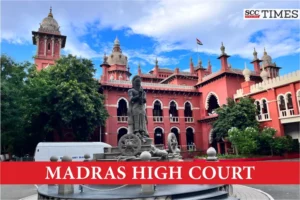Madras High Court: In a writ petition filed directing the Director General of Police to grant 28 days ordinary leave without escort to the petitioner’s husband, who is a convict prisoner confined at Central Prison, S.M. Subramaniam, J. held that the writ petitions filed prematurely before expiry of the statutory time limit of 28 days as contemplated under the Tamil Nadu Suspension of Sentence Rules, 1982 (‘Rules, 1982’) are not entertainable for grant of ordinary leave. Applications for emergency leave are to be considered forthwith by the Competent Authority without causing any delay. An order of rejection of leave application would provide a cause for instituting the writ petition challenging the same.
The Court clarified that the practice of filing premature writ petitions need not be entertained by the High Court unless there is an extraordinary circumstance. In normal course, the competent Authorities must be allowed to take a decision in accordance with the Rules and in the event of rejection, the cause would arise for the purpose of instituting writ proceeding.
The Court took note of Rules 23 and 24 of the Rules, 1982 and noted that the above rules unambiguously stipulates that the petition for ordinary leave shall be submitted by the prisoner or by the relative of the said prisoner to the Deputy Inspector General of Prisons concerned, direct or sent through the Superintendent of Prison where the prisoner to whom leave is to be granted is confined. Therefore, processing of petition has been clearly stipulated and each Authority under the Rules is bound to exercise their powers in the manner contemplated under the said Rules. The Authorities are expected to avoid unnecessary delay, since the right to avail leave by the prisoners need not be denied. A speaking order must be passed while granting or rejecting leave, since the reasons are live link for decisions.
The Court emphasised that the Authorities are duty bound to process the leave applications submitted by the prisoners or their relatives in accordance with the Rules and the same are to be processed strictly in adherence with the time limits stipulated under Rule 24 of Rules, 1982.
Further, the Court said that the Authorities failing in their duties to perform the statutory obligations are to be viewed seriously. Such lapses are to be construed as official lapses, dereliction of duty and negligence warranting disciplinary action against the Officials concerned. The right of the prisoners is to be protected by the Prison Authorities. Therefore, adhering to the Rules in its strict sense is mandatory.
The Court noted that the present writ petition was filed even before the date of expiry of the statutory period as per the Rules to dispose of the leave petition by the Competent Authority under the Tamil Nadu Suspension of Sentence Rules, 1982. Thus, the present writ petition is premature on the date of filing. However, giving an exception in the present case, since during the pendency of the present petition, the statutory period expired and again remanding the matter becomes unnecessary.
Thus, the Court granted ordinary leave to the prisoner for a period of 21 days, without escort commencing from 06-09-2024 on certain conditions.
Further, the Court directed Director General of Prisons to issue consolidated instructions to all the Subordinate Prison Authorities to ensure that the leave applications filed by or on behalf of the prisoners are processed scrupulously in accordance with the Rules and decisions are taken within a period of 28 days as contemplated under Rule 24(5) of the Rules, 1982.
The Court concluded that the writ petitions filed prematurely before expiry of the statutory time limit of 28 days as contemplated under the Tamil Nadu Suspension of Sentence Rules, 1982 are not entertainable for grant of ordinary leave. Applications for emergency leave are to be considered forthwith by the Competent Authority without causing any delay. An order of rejection of leave application would provide a cause for instituting the writ petition challenging the same.
[Usha v. Director General of Police, 2024 SCC OnLine Mad 4786, decided on 29-08-2024]

